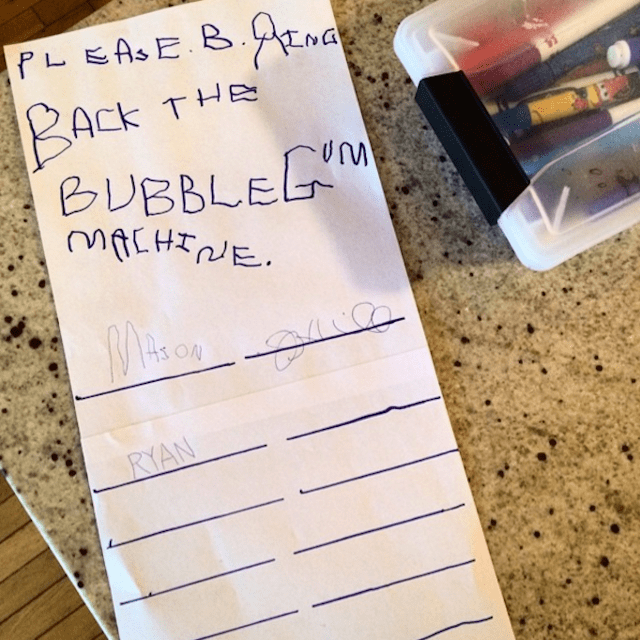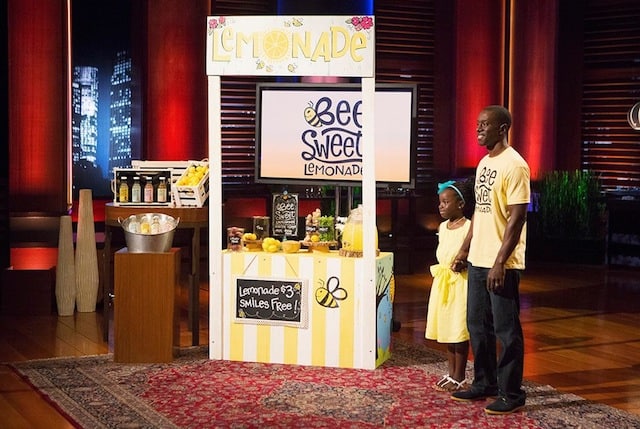
For the past week or two, I’ve been seeing stories about young kids getting what they want. I don’t mean in a bait-y, “This First Grader Had The Perfect Response To A Teacher’s Closed-Minded Math Question” kind of way. I mean in a career-minded, actually getting what they want kind of way. Last week, a nine-year-old boy in Carroll Gardens was making waves with his 25 cents a case detective agency. Meanwhile, an 11-year-old girl had just struck a multi-million dollar deal with Whole Foods to sell her own boutique brand of lemonade. And a couple days ago, DNAinfo reported that a four-year-old in TriBeCa had successfully lobbied to get a gumball machine re-installed in his neighborhood grocery store after the old one disappeared.
Call me crazy, but… should we be taking notes? Are these preschoolers the Silicon Valley startup CEOs of tomorrow?
In their article about Mason Miller, the 4-year-old who petitioned for the gumball machine, DNAinfo called him “precocious.” His mother described him as “unusual in the best way.”
The article is a little tl;dr, what with all the praise they showered on the kid and the mother’s cooing commentary. But here’s the gist: after Best Market replaced a Food Emporium in TriBeCa, the gumball machine that had become a staple of grocery trips for the Miller family disappeared. When he became distressed about it, little Mason was encouraged to take a business-minded approach to getting it back.
___________

Of course, it wasn’t just Mason’s attempts that got Best Market’s manager to take him seriously:
Mason’s mom persisted. When she was asked for feedback at the supermarket about what she thought about the new food shopping center, she mentioned her son missed the gumball machine.
After Mason’s mother “persisted,” Mason was inspired to present his case to his class of fellow pre-schoolers. He brought his signed petition (with probably about eight signatures, judging from the size of that paper) and went back to the store, “where another manager thought the whole endeavor was just adorable.”
Is this the face of modern-day entrepreneurship? Have someone slightly more authoritative vetting your cause, and be adorable? It’s not such a reach to translate that to message about seeking out mentors and about the value of personal branding.
In the case of Alex Roth Chesin, it wasn’t so much persistence as gentle support. According to DNAinfo, nine-year-old Chesin’s parents made him a detective sign because it was a way to enliven his imagination and prove that there was “no case too small.” From Chesin’s father, Jansen Po:
”We just thought it was entertainment for ourselves, and it didn’t really occur to us that other people would be buzzing about it — or if they did, we just assumed they would see it, chuckle at it, and move on,” Po said.
Did the Chesins have the last laugh, though, or did their son? Alex Roth Chesin is now pretty blog famous, at least in Brooklyn. He’s probably gotten fun cases from it, too, and can in the future put this agency down as a small business venture on his CV. Maybe we should be getting more creative with discarded pallets and other curbside fare for our business signage. Maybe we too should test out our cooking or sell our cool stuff using sidewalk stands on side-streets, instead of waiting for an app to make it easier for us. No exposure is bad exposure.
__________

Mikaila Ulmer is proof that it doesn’t even take parental authority to cultivate business savvy at a young age. Sometimes, it just takes supervision. The 11-year-old entrepreneur hit it big with the Whole Foods deal after she was the youngest contestant ever to appear on Shark Tank, pitching a honey-infused lemonade (with her father beside her, natch) that she’d developed at the age of four to overcome her fear of bees. Well, “developed” is maybe too formal of a word. Or is it? Is the kindergartener’s kitchen just a crude R&D lab? That’s practically where small-batch handcrafted foods are born.
Ulmer’s success story is intimidating, to say the least. Her lemonade is sold in Whole Foods stores nationwide and has an impressive multifaceted mission. You can engage Ulmer to speak at corporate events. Far from finding her pitch “adorable,” FUBU CEO and Shark Tank panelist Daymond John told NBC that “partnering with Mikaila made perfect sense,” because “she’s a great kid with a head for business and branding.”
At seven years old, I started a restaurant in my living room. We only served peanut butter and jam sandwiches, and we were only open on weekends. But did my parents invite food critics, or put a sandwich board with the day’s specials outside on our lawn? No. Instead, I experienced crushing failure when they stopped wanting to eat PB & J every Saturday and Sunday.
I’m not sure whether we’re just living in a time where parents are giving their kids more of a boost, or whether “Sam’s Magnificent Restaurant” was just a bad idea. Either way, it’s clear that entrepreneurship doesn’t have to start as late as your twenties, and you certainly don’t have to suffer through unpaid internships or shady millenn-ipulating startups to make it. You can decide whatever you want about the stories above, but at the very least get up off your couch and make a dime or a difference somewhere this week. Because these kids are beating you to it.
Follow Sam — who, sadly, peaked at age 12 — on Twitter: @ahoysamantha
Leave a Reply



